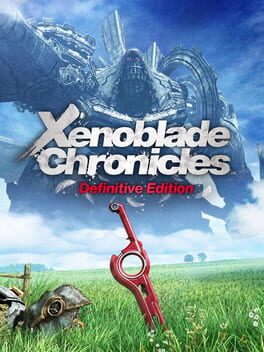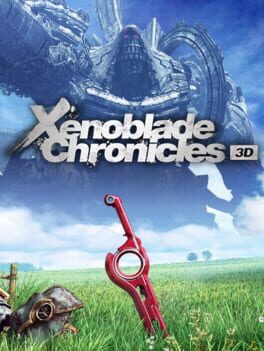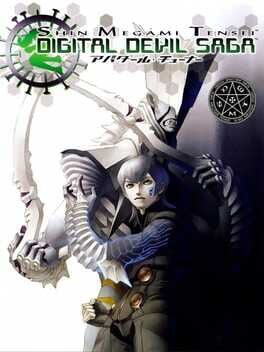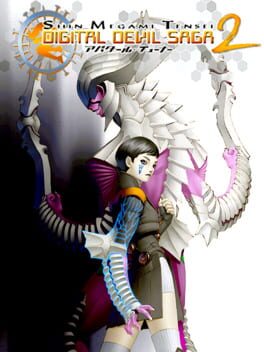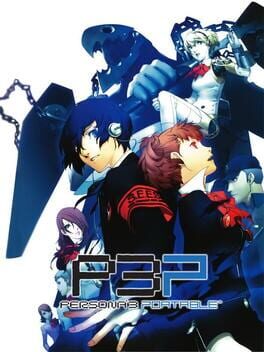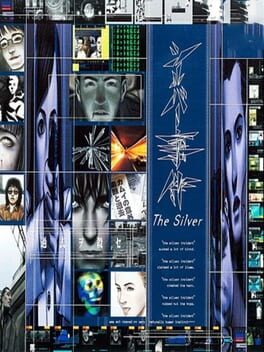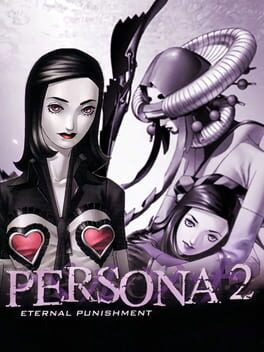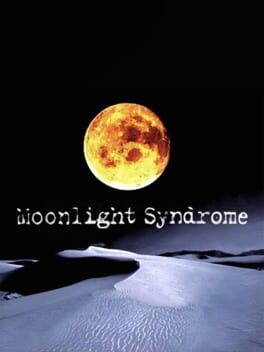TurtleGuy1
15 Reviews liked by TurtleGuy1
Xenogears
1998
Going into Xenogears, I knew 3 things. The first was that this game was supposed to be Final Fantasy VII, a game I played just a few months ago and became an instant favorite. The second is that due to a hard locked release schedule, the team didn't have enough time to properly "finish" Xenogears. The third is that it's basically just Evangelion.
I also felt it was fair to assume that this was gonna be a favorite. What I didn't assume was that this game would challenge the way I think about my relationships. At the age of 22, I didn't really think I would be able to have my worldview shifted by stories anymore. That was a thing for my teenage years. I get now this was a stupid thing to think.
I struggle to think about what I can even say about a classic like this that's unique or fresh. It's an old beloved RPG, everything that can be said about it has. So in order to talk about it I have to get vulnerable. Hi. My name is Mads. I have BPD.
The way being borderline has impacted my relationships is almost all internal. I seek validation, I want to belong, to have an impact on the people I love. Nothing I or they can do is able to convince me of that. I feel incomplete. Consequently, I feel my relationships are hollow because of me. I'm not able to get as intimate as I'd want to. I'm not able to ask for a shoulder to lean on. It feels selfish. It feels undeserved.
There's a scene about a third into this game that hammered home just how much this game made me feel seen. Without going into specifics, it involves 2 of the main cast members talking about how incomplete they feel. One describes their acts of kindness as a selfish act because they don't feel they belong, and all they hope to get out of that kindness is a place to be. The other validates that it's ok to act kindly out of selfishness. Eventually, in trying to fill yourself up, you'll complete yourself with the lives of those around you.
Another scene in disc 2, which was a flashback regarding the history of one of the main characters and explaining why they are the way they are, filled me with an intense urge to call my abusive mom and say "I'm sorry." I can't explain that. I have nothing to be sorry for. It's not my fault she treats me the way she does. I don't know what else to do besides talk about it, because god knows I have no interest in following through on that.
As far as this game not being finished goes, well, I don't think it's fair to call it that. It's a front to back story. It covers all the beats it needs to in order to function. Sure it's not fully realized, but I think it's okay to not be whole.
I also felt it was fair to assume that this was gonna be a favorite. What I didn't assume was that this game would challenge the way I think about my relationships. At the age of 22, I didn't really think I would be able to have my worldview shifted by stories anymore. That was a thing for my teenage years. I get now this was a stupid thing to think.
I struggle to think about what I can even say about a classic like this that's unique or fresh. It's an old beloved RPG, everything that can be said about it has. So in order to talk about it I have to get vulnerable. Hi. My name is Mads. I have BPD.
The way being borderline has impacted my relationships is almost all internal. I seek validation, I want to belong, to have an impact on the people I love. Nothing I or they can do is able to convince me of that. I feel incomplete. Consequently, I feel my relationships are hollow because of me. I'm not able to get as intimate as I'd want to. I'm not able to ask for a shoulder to lean on. It feels selfish. It feels undeserved.
There's a scene about a third into this game that hammered home just how much this game made me feel seen. Without going into specifics, it involves 2 of the main cast members talking about how incomplete they feel. One describes their acts of kindness as a selfish act because they don't feel they belong, and all they hope to get out of that kindness is a place to be. The other validates that it's ok to act kindly out of selfishness. Eventually, in trying to fill yourself up, you'll complete yourself with the lives of those around you.
Another scene in disc 2, which was a flashback regarding the history of one of the main characters and explaining why they are the way they are, filled me with an intense urge to call my abusive mom and say "I'm sorry." I can't explain that. I have nothing to be sorry for. It's not my fault she treats me the way she does. I don't know what else to do besides talk about it, because god knows I have no interest in following through on that.
As far as this game not being finished goes, well, I don't think it's fair to call it that. It's a front to back story. It covers all the beats it needs to in order to function. Sure it's not fully realized, but I think it's okay to not be whole.
I wrote an April fools review for this where I just linked to a YouTube video relating to Kagurabachi (read that instead of this tbh). I think it’s fair I write an actual review on this. For starters what a 4/10 game this is. First problem is the world design and how it doesn’t really make you want to explore. In most cases your gonna to find what a rare enemy or a landmark that gives out exp which you can get while grinding. I’m no master at this game I will never argue that but it feels to me that at a certain point being underleved can make fights next to impossible. Doesn’t help that the main ways to get exp are through the fights, exportation, and side quests. All of them are not great with fights you get minimal amount of exp where you have to take on hoards of enemies to gain a single level. Exploration can also grant exp but it’s usually not too much unless it’s a hidden area. On the topic of exploration I just have to say why is climbing so slow and traversal in general makes it a bitch to get anywhere and it’s not like in God of War 2018 where Kratos and Arteus have a conversation whenever they are in the boat to distract you from the nothing gameplay going on. That leaves the side quest and holy pad most of them are fetch quests and add nothing. Sometimes you get an interesting reward like Monado armor but I never got it and I was fine. Alright so most of your exp is combat but that has to be good right uuuuuuuuh. I think near the start the combat is alright when you team is pretty limited on what you can do and you have to plan accordingly (even though you can’t control your teammates). However by late game every encounter just was topple locking the enemies gaining energy for a chain attack and doing it again. Which just stems from being punished for being in encounters for too long. It makes Sharla the healer awful since she is made to be low dps but keep you alive for longer but fighting longer just sucks. So in conclusion Light heal> Sharla. The only saving grace for combat is visions which show you when a big attack is coming and how to deal with it. A decent way to make people not spam chain attacks all the time since they are overpowered. Quick thing on chain attacks why is the chance of it ending random that makes no sense. Visuals: they look fine nothing groundbreaking but fine for what they are. Music: it’s fine gets the job done I’m not a huge music guy and it should be set dressing and not a major part of why you enjoy the game. Alright plot some yall call this peak? Let’s start with the obvious why do they always make it obvious there is something going to happen. Easy example is Dickson where he has his ever iconic line “I feel bad for manipulating those kids” and it’s supposed to be played for a big twist in the third act. This is like that one line in the DORA THE EXPLORER movie where the adult character kept saying he was a bad guy. I think a better idea would be a more sidelined manipulator like Makima where if you are paying attention you notice something is off but to the average person would not pick up on it. But that’s the easy answer they wouldn’t make it obvious that the character that was killed off is alive right. What do you mean they pretty clearly tease Fiora’s return. Blonde hair and and breasts it could be anyone especially not girl who had blond hair and moderately sized breasts but was “dead”. But favorite one was definitely that Gadolt is still alive. Like they don’t mention his ass for more then half the game but the moment they do a new robot is keeping an eye on them. Oh of course it’s Gadolt. Onto the actual plot two titans clashed but eventually brought forth different life biological in bionis and Mechanical in mechonis (very original names). They were bitter enemies for some unknown reason (we are keeping tally of every anime trope ) 1. This came to ahead with a battle that will deiced the fate of the bio vs mech life. Fuck this cliffnotes going to go full speed ahead. Shulk is just your average orphan 2 that lives a quiet life 3 with his friends. Till one day the enemy that hadn’t attacked in ages did 4 and Shulk finds out he is special 5 and can wield a special blade called the Monado. His journey is about growing and changing his perspective.He starts his adventure with pure revenge but develops into something more. He meets people from a variety of places 6. This all pulls ahead when his motivation is alive and that guy from the prologue is alive. He then learns that not all Mechon are bad 7. They travel to Mechonsis and learn that they attacked first 8. Shulk tries to make peace until he is interrupted by Dickson doing that evil thing and unleashing the true villain who was inside Shulk all along 9 and he can be considered a god 10. Shulk believes hard enough and comes back and defeat god in a quick enough recap. Anyways time to bitch about Zanza. First off they make it pretty obvious that he is the final boss just due to how the game is set up. You skip two major parts of bionis being most of prison island and inner bionis which had my head scratching till I realized that they were probably going to pull a the bad guys aren’t the actual villain. With making some of the people of mechonis good. Yeah I called Zanza being the final boss. Also his ass barley does anything he could took control at like any moment but didn’t that makes like 0 sense. This isn’t even a why didn’t Jotaro use Star finger. Since he is op on his own and could probably solo most of Mechonis since their god was stuck in Fiora for some reason (I don’t remember if it’s explained you I will not bitch). Also this is a more minor nitpick I wish he looked a little more different then his original human form since he is a god. Alright let’s wrap this up characters I won’t comment on since I used like the same 3 so I saw no heart to hearts. Shulk is a fine protagonist except he still has trouble telling his team about visions. What did I think of future connected? Didn’t play it. Will you play 2. Hell nah. In conclusion go read Kagurabachi for some good action adventure.
esse jogo eh a maior pegadinha dos jrpgs me venderam a segunda vinda de jesus cristo em um jogo e eu recebi 55 horas do pior sotaque britanico ja visto sendo constantemente gritado no meu ouvido enquanto eu repetia o mesmo combate de mmo para prosseguir em uma historia que eh a fusão todos os rpgs dos anos 2000 em um. eu recomendo que voce escute a trilha sonora pq ela eh pedrada e veja os cenarios bonitos mas nao precisa jogar nao (curiosidade: com 55 horas eu poderia ter feito um curso de mecanica e agora eu saberia trocar agua de carro mas eu escolhi jogar esse jogo )
Frog Minutes
2011
Persona 3 Portable
2009
Silver Jiken
1999
This review contains spoilers
I was legitimately surprised what a large leap this was over Innocent Sin. That's not to say that EP fixes every issue but it feels like a much more complete product overall.
The combat feels way more involved and interesting without becoming too easy either. It felt like I was actually meant to plan out each turn and not just autobattle everything to death which was a nice change of pace, and made SP management way less of a nuisance and fusion spells way more fun to use. It compensates by making battles more difficult, which is a welcome change and there are plenty of ways it throws a wrench into your setup. I won't go as far as to call it perfect, because I still ended up estoma-ing through some dungeons, but it's probably the best way to maximize this system. The dungeon layouts are probably the area that's seen the least improvement, probably the weakest aspect of the P2 duology as a whole. The less random traps is nice but the sprawling layouts didn't really do much more for me.
I would be lying though if I said the story isn't where this game is at it's best. The cast is absolutely fantastic and made me actively want to talk to them in every location, I'm honestly surprised so many people seem to like IS' cast better. There's a really strong overarching theme with how each of them struggles with adulthood, from past regrets to uncertainty about the future, and the new drive they each get at the end feels really satisfying. I really enjoyed the spin on Tatsuya's character as well, Innocent Sin really helped to put you in his shoes and EP delivers on that. It does a really good job of showing the pain he's been through, and his struggle with leaving behind his friends feels powerful after having a whole game to see those bonds. There were real stakes at play and they were delivered on excellently by the ending, I appreciate how it has real consequences for Tatsuya even if it is tragic. Also worth mentioning how amazing the last FMV is too, while Maya doesn't have the character she had in IS due to being the protagonist I think it was a great way to show how she's learned from others to not let the past torment her.
(Side note but I don't have much to say about the Persona 1 stuff since I haven't played it yet, though I knew enough for it to be enjoyable enough)
This game was a much different tone and feel than the other Persona games I've played, but I appreciate it a lot for that. I'm not sure whether they'll make something like this again, and that speaks to how unique it feels, like it was on the border between old and new Persona and Atlus as a whole. EP really brings out the best of what IS does well, while making a lot of it's own improvements and bringing a really strong story and cast to the table as well.
The combat feels way more involved and interesting without becoming too easy either. It felt like I was actually meant to plan out each turn and not just autobattle everything to death which was a nice change of pace, and made SP management way less of a nuisance and fusion spells way more fun to use. It compensates by making battles more difficult, which is a welcome change and there are plenty of ways it throws a wrench into your setup. I won't go as far as to call it perfect, because I still ended up estoma-ing through some dungeons, but it's probably the best way to maximize this system. The dungeon layouts are probably the area that's seen the least improvement, probably the weakest aspect of the P2 duology as a whole. The less random traps is nice but the sprawling layouts didn't really do much more for me.
I would be lying though if I said the story isn't where this game is at it's best. The cast is absolutely fantastic and made me actively want to talk to them in every location, I'm honestly surprised so many people seem to like IS' cast better. There's a really strong overarching theme with how each of them struggles with adulthood, from past regrets to uncertainty about the future, and the new drive they each get at the end feels really satisfying. I really enjoyed the spin on Tatsuya's character as well, Innocent Sin really helped to put you in his shoes and EP delivers on that. It does a really good job of showing the pain he's been through, and his struggle with leaving behind his friends feels powerful after having a whole game to see those bonds. There were real stakes at play and they were delivered on excellently by the ending, I appreciate how it has real consequences for Tatsuya even if it is tragic. Also worth mentioning how amazing the last FMV is too, while Maya doesn't have the character she had in IS due to being the protagonist I think it was a great way to show how she's learned from others to not let the past torment her.
(Side note but I don't have much to say about the Persona 1 stuff since I haven't played it yet, though I knew enough for it to be enjoyable enough)
This game was a much different tone and feel than the other Persona games I've played, but I appreciate it a lot for that. I'm not sure whether they'll make something like this again, and that speaks to how unique it feels, like it was on the border between old and new Persona and Atlus as a whole. EP really brings out the best of what IS does well, while making a lot of it's own improvements and bringing a really strong story and cast to the table as well.
The Silver Case
2016
the silver case is difficult to discuss. your knowledge of suda51's work, enjoyment of visual novels, and how much you can tolerate arbitrary ass writing will make or break your experience with this game.
personally, i am absolutely in love with this game, and it's my favorite visual novel of all time. it has an incredibly unique presentation that creates an atmosphere i've never experienced in any other game, let alone suda51's other work, through the incredible artwork and soundtrack. objectively this game has fantastic character writing, with the transmitter route featuring an amazing cast and the placebo route having one of the best protagonists ive ever seen in media.
the story is hit or miss. its admittedly word dumpy at times, and there are some plot beats that can breeze by you but suddenly be super relevant later. characters can be hard to remember across chapters, hell, theyre usually drawn completely differently depending on the chapter. i took alot of time to process this game, but i understand that not everyone is willing to OR able to make that time. these aspects don't bother me enough to dock points, but it's worth considering
the gameplay is Fine. just Fine. it's weird to get used to, but you'll have it down after the first 2 chapters. this is TECHNICALLY an adventure game, so there are puzzles and interactables strewn about- but usually it's super easy to figure out, and the game even autosolves puzzles for you if you can't be fucked. as expected of a vn, the gameplay is just there to present the story (insane)
the silver case, again, is my favorite vn of all time. it has incredible depth for grasshopper manufacture's first release and still holds up today with its themes of criminal psychology, individuality, and wooowowaha government conspirarcy woaowow. but its true the game isnt very approachable and can be hard to sit through for some people. i think it is very, very worth it though, as a gateway to "kill the past" and especially in relation to its sequels, FSR and the 25th ward: the silver case
personally, i am absolutely in love with this game, and it's my favorite visual novel of all time. it has an incredibly unique presentation that creates an atmosphere i've never experienced in any other game, let alone suda51's other work, through the incredible artwork and soundtrack. objectively this game has fantastic character writing, with the transmitter route featuring an amazing cast and the placebo route having one of the best protagonists ive ever seen in media.
the story is hit or miss. its admittedly word dumpy at times, and there are some plot beats that can breeze by you but suddenly be super relevant later. characters can be hard to remember across chapters, hell, theyre usually drawn completely differently depending on the chapter. i took alot of time to process this game, but i understand that not everyone is willing to OR able to make that time. these aspects don't bother me enough to dock points, but it's worth considering
the gameplay is Fine. just Fine. it's weird to get used to, but you'll have it down after the first 2 chapters. this is TECHNICALLY an adventure game, so there are puzzles and interactables strewn about- but usually it's super easy to figure out, and the game even autosolves puzzles for you if you can't be fucked. as expected of a vn, the gameplay is just there to present the story (insane)
the silver case, again, is my favorite vn of all time. it has incredible depth for grasshopper manufacture's first release and still holds up today with its themes of criminal psychology, individuality, and wooowowaha government conspirarcy woaowow. but its true the game isnt very approachable and can be hard to sit through for some people. i think it is very, very worth it though, as a gateway to "kill the past" and especially in relation to its sequels, FSR and the 25th ward: the silver case
The Silver Case
2016
ENG:
The stars know everything. I remember
a song like that. But the fact that they
know everything is a sad thing. There are
more things in this world that it’s
better not to know.
The Silver Case is a visual novel. One of those that barely has any gameplay. It’s hard to say it even has mechanics, even for the few puzzles it has, the game gives you a handy button to automatically resolve them. Yes, I say this as a negative. I don’t like the almost non-existent gameplay it has, for the first few hours I felt a bit bored ‘cause I was reading on and on, getting interrupted at every step I made to explain the one or two important mechanics, and it didn’t felt like anything was going on with the plot. I also say this as a negative, the start of the game is a bit slow and as a tutorial it’s not that great either. It doesn’t even has a choice-making system, so your role as a player is rather tiny. For the first hours, I thought I wasn’t gonna like it, and had it been any other game, it could have been that way. The fact that the game doesn’t seems to do any real effort to involve the player as part of the world (although it does some stuff I won’t tell), means that all the effort is carried by the narrative, and turns out that this is one of best narrative I’ve had the pleasure to experience in a video game.
The beginning, and here I refer to the first one or two hours, is rather slow and at first it doesn’t seem to add much to the overarching narrative. To not be that boring, the game presents the narrative in a more dynamic way than most VNs, with different pictures, colours and scenery, and from time to time, it lets us walk and interact with the world in a very limited way. It looks like the beginning is setting up the ground for a typical crime thriller about catching a serial killer, but as it goes on, things are not what they seem and a more sinister reality is hidden beneath the surface. I don’t want to start spoiling the plot, so let’s talk about characters. Their characterization is excellent. They’re pretty much just text attached to static images, but their personalities and how they’re written makes them differentiable from one another. So differentiable that I ended up giving most of them a unique voice while reading. Even the Barman (yes, that’s how they name him), which has a minor role, is an interesting character. Kusabi must be, without a doubt, the best character in the game, alongside Tokio Morishima. Both are great characters to me, each in their own way. Kusabi is the typical cop that is always bitter and never smiles; Morishima is a nobody that gets involved in all this mess without knowing why or what are his objectives. Kusabi, although not the protagonist, he might as well be, but Morishima is actually the main character of his own story. Because yeah, the story is split in two. There’s Transmitter, where you follow the investigation carried out by the HC Unit (Kusabi & Co.), but there’s also Placebo, where Morishima investigates whatever the HC Unit puts their noses in. Transmitter has us in the most Noir side of the story while Placebo has us in the most personal, day to day life of a dude who apparently doesn’t have anything to do with all this crap besides being paid to dig on it.
As the story goes on, it’s not entirely clear what is actually going on or where is it leading to. The narrative is deliberately obtuse to evoke the feeling of mystery, and makes everything feel like a big puzzle to solve although it’s extremely linear. It’s true that by the end, everything seems to be more or less resolved with some loose ends, but before getting there, all is shrouded in an aura of mystery and you never exactly know what is real and what is not, what is true and what not, or how much truth there is in what we’re being told. Once the second third is over, the game takes a wild turn really hard to predict and it’s then when you start to realize what this is all about. The game turns from a simple crime investigation to what I can best describe as surreal existentialism. It’s then when the game seems to ask itself almost philosophical questions about fate, what it is to be a human being, the meaning of life, and probably more stuff I might have overlooked. All of this is left in the background as secondary ideas as they don’t get much development, but they don’t need to, because The Silver Case is not about (just) those ideas. What The Silver Case is actually about, is truth. Not about the importance of truth or something similar, at least not just that, but truth in more general terms, as a concept in a philosophical sense I’d say. Crime thrillers have always been about truth after all. In this case, the truth is much more crude than the hidden intentions of a serial killer. Truth might take you to places and to see stuff you wouldn’t think possible, and in the end, it may turn out that it was best to not know it. Truth would have ended showing up sooner or later with no prior warning anyways, and by then you need to be prepared to face it. It’s here where the “Kill The Past” thing originates from. As I stated early in the review, the beginning of the game is rather slow and seemingly uneventful, but there’s a moment in the game where everything sort of clicks and starts making sense. The more you search for truth, the harder it gets to draw where it starts and ends and how far things are gonna go. There are more things in this world that it’s better not to know, and you’ll understand at some point. They say ignorance is bliss. It may be true after all.
ESP:
The stars know everything. I remember
a song like that. But the fact that they
know everything is a sad thing. There are
more things in this world that it’s
better not to know.
The Silver Case es una novela visual. Novela visual de las que no tienen jugabilidad ninguna. De hecho, a duras penas se puede decir que tenga mecánicas, y encima, los pocos puzzles que tiene ni siquiera hace falta que los resuelvas tú, ya que el juego pone un botón bastante cómodo para resolverlos por ti y que no tengas mucho que hacer. Sí, esto que comento es algo negativo. No me gusta la casi nula jugabilidad que tiene, durante las primeras horas llegué a estar un tanto aburrido ya que solo leía y leía, además me cortaban constantemente a cada paso que daba para explicar las una o dos mecánicas importantes, y tampoco sentía que estuviese pasando nada. Esto también es un comentario negativo, considero el inicio del juego un tanto lento, y como tutorial tampoco es nada del otro mundo y puede llegar a aburrir. Por no tener, no tiene siquiera un sistema de toma de decisiones, con lo que tu papel como jugador es bastante minúsculo. Durante las primeras horas pensaba que no me iba a gustar, y si hubiese sido cualquier otro juego, seguramente así hubiese sido. El hecho de que el juego no parezca hacer ni el más mínimo esfuerzo en involucrar al jugador como parte del mundo (aunque sí que tiene algunas cosas que prefiero no desvelar), significa que todo el trabajo lo va a tener que hacer la narrativa, y se ha dado que es una de las mejores narrativas que he tenido el placer de vivir en un videojuego.
El comienzo, y aquí me refiero a las primeras horas, resulta un tanto lento y en principio no parece añadir mucho a la narrativa principal. Para no aburrir tanto, el juego presenta su narrativa de una manera más dinámica que en la mayoría de NV, con diferentes planos, colores y escenarios, y de vez en cuando nos deja caminar e interactuar de manera muy limitada con el entorno. El inicio parece sentar las bases de lo que sería el típico thriller de atrapar a un asesino en serie, pero según avanza la trama, las cosas no son lo que aparentan y cosas más siniestras se esconden bajo la superficie. No quiero adentrarme mucho en spoilers, con lo que voy a hablar un poco de los personajes. Me parece excelente la caracterización de cada personaje. Pese a que no sean más que texto adjunto a imágenes estáticas, sus personalidades y la manera en la que están escritos hace que sean muy diferenciables unos de otros. Tan diferenciables son que yo mismo acabé poniendo voces específicas a casi todo el elenco mientras leía. Hasta el Barman (sí, se llama así) es un personaje interesante, y eso que lo ves poco. Kusabi tiene que ser, con diferencia, el mejor personaje de todo el juego, junto a Tokio Morishima. Ambos me parecen personajes excelentes, cada uno a su manera. Kusabi es el poli que está siempre amargado y que no sonríe nunca; Morishima es un cualquiera que se ha visto envuelto en todo esto por azares del destino sin tener del todo claro cuál es su objetivo. Kusabi, si bien no es el protagonista, bien podría serlo, y Morishima si que es el protagonista de su propia trama, porque sí, la historia está dividida en dos. Por una parte tienes Transmitter, donde sigues los quehaceres de la HCU (Kusabi y compañia), y por otra está Placebo, donde Morishima investiga en paralelo y por cuenta propia todo lo que tiene algo que ver con lo que la HCU investiga. Transmitter nos lleva a la parte más policíaca de la historia mientras que Placebo nos acerca, de manera muy personal, al día a día de una persona que en principio no parece tener razones personales para estar involucrado.
Conforme la historia sigue adelante, no queda del todo claro qué es lo que está pasando o a dónde va a parar todo esto. La narrativa es deliberadamente obtusa en según que aspectos para evocar la sensación de misterio, y hace que se sienta todo como un gran puzle a resolver pese a que sea extremadamente lineal. Ya por el final, es cierto que todo queda más o menos resuelto, aunque sí que deja algunos cabos sueltos, pero hasta llegar ahí todo está envuelto en un aura de misterio y nunca termina de quedar claro que es cierto y que no, que es real y que no, o cuanta verdad hay en lo que nos cuentan. Ya terminado el segundo tercio, la historia da un cambio radical que es muy difícil ver venir y es entonces cuando empiezas a entender de lo que va en realidad. Da un giro que pasa al juego de una simple resolución de un caso criminal a lo que mejor puedo describir como existencialismo surrealista. Es ahí cuando empieza a hacerse preguntas cuasi filosóficas sobre el destino, lo que es ser humano, el sentido de la vida y algunas cosas más que seguramente habré pasado por alto. Todo esto queda en un plano secundario ya que no se desarrolla lo suficiente, pero no lo necesita, ya que The Silver Case no va de (solo) esos temas. De lo que en realidad trata The Silver Case es de la verdad. No de la importancia de la verdad o algo así, al menos no solo de eso, sino de la verdad más a rasgos generales, como concepto en un sentido filosófico diría yo. Los thrillers criminales siempre han sido sobre la verdad, después de todo. Y en este caso, la verdad es mucho más cruda que las intenciones secretas de un asesino en serie. La verdad puede llevarte a lugares y hacer ver cosas que no creerías posibles, y puede que al final resulte que lo mejor era no saberla. De todas formas, la verdad acabará llegando tarde o temprano y sin previo aviso, y para entonces hay que estar preparado para saber cómo afrontarla. Es de ahí de donde viene lo de “Kill The Past”. Si bien, como al principio dije, el comienzo del juego resulta un poco lento y no parece aportar mucho, hay un momento en el juego en el que todo hace clic y empieza a tener sentido. Cuanto más buscas por la verdad, más difícil es dibujar dónde empieza y dónde termina y cómo de lejos va a llegar todo esto. Hay cosas en este mundo que sería mejor no saber, y en algún momento lo acabarás entendiendo. Dicen que la ignorancia es una bendición, quizás sea cierto después de todo.
The stars know everything. I remember
a song like that. But the fact that they
know everything is a sad thing. There are
more things in this world that it’s
better not to know.
The Silver Case is a visual novel. One of those that barely has any gameplay. It’s hard to say it even has mechanics, even for the few puzzles it has, the game gives you a handy button to automatically resolve them. Yes, I say this as a negative. I don’t like the almost non-existent gameplay it has, for the first few hours I felt a bit bored ‘cause I was reading on and on, getting interrupted at every step I made to explain the one or two important mechanics, and it didn’t felt like anything was going on with the plot. I also say this as a negative, the start of the game is a bit slow and as a tutorial it’s not that great either. It doesn’t even has a choice-making system, so your role as a player is rather tiny. For the first hours, I thought I wasn’t gonna like it, and had it been any other game, it could have been that way. The fact that the game doesn’t seems to do any real effort to involve the player as part of the world (although it does some stuff I won’t tell), means that all the effort is carried by the narrative, and turns out that this is one of best narrative I’ve had the pleasure to experience in a video game.
The beginning, and here I refer to the first one or two hours, is rather slow and at first it doesn’t seem to add much to the overarching narrative. To not be that boring, the game presents the narrative in a more dynamic way than most VNs, with different pictures, colours and scenery, and from time to time, it lets us walk and interact with the world in a very limited way. It looks like the beginning is setting up the ground for a typical crime thriller about catching a serial killer, but as it goes on, things are not what they seem and a more sinister reality is hidden beneath the surface. I don’t want to start spoiling the plot, so let’s talk about characters. Their characterization is excellent. They’re pretty much just text attached to static images, but their personalities and how they’re written makes them differentiable from one another. So differentiable that I ended up giving most of them a unique voice while reading. Even the Barman (yes, that’s how they name him), which has a minor role, is an interesting character. Kusabi must be, without a doubt, the best character in the game, alongside Tokio Morishima. Both are great characters to me, each in their own way. Kusabi is the typical cop that is always bitter and never smiles; Morishima is a nobody that gets involved in all this mess without knowing why or what are his objectives. Kusabi, although not the protagonist, he might as well be, but Morishima is actually the main character of his own story. Because yeah, the story is split in two. There’s Transmitter, where you follow the investigation carried out by the HC Unit (Kusabi & Co.), but there’s also Placebo, where Morishima investigates whatever the HC Unit puts their noses in. Transmitter has us in the most Noir side of the story while Placebo has us in the most personal, day to day life of a dude who apparently doesn’t have anything to do with all this crap besides being paid to dig on it.
As the story goes on, it’s not entirely clear what is actually going on or where is it leading to. The narrative is deliberately obtuse to evoke the feeling of mystery, and makes everything feel like a big puzzle to solve although it’s extremely linear. It’s true that by the end, everything seems to be more or less resolved with some loose ends, but before getting there, all is shrouded in an aura of mystery and you never exactly know what is real and what is not, what is true and what not, or how much truth there is in what we’re being told. Once the second third is over, the game takes a wild turn really hard to predict and it’s then when you start to realize what this is all about. The game turns from a simple crime investigation to what I can best describe as surreal existentialism. It’s then when the game seems to ask itself almost philosophical questions about fate, what it is to be a human being, the meaning of life, and probably more stuff I might have overlooked. All of this is left in the background as secondary ideas as they don’t get much development, but they don’t need to, because The Silver Case is not about (just) those ideas. What The Silver Case is actually about, is truth. Not about the importance of truth or something similar, at least not just that, but truth in more general terms, as a concept in a philosophical sense I’d say. Crime thrillers have always been about truth after all. In this case, the truth is much more crude than the hidden intentions of a serial killer. Truth might take you to places and to see stuff you wouldn’t think possible, and in the end, it may turn out that it was best to not know it. Truth would have ended showing up sooner or later with no prior warning anyways, and by then you need to be prepared to face it. It’s here where the “Kill The Past” thing originates from. As I stated early in the review, the beginning of the game is rather slow and seemingly uneventful, but there’s a moment in the game where everything sort of clicks and starts making sense. The more you search for truth, the harder it gets to draw where it starts and ends and how far things are gonna go. There are more things in this world that it’s better not to know, and you’ll understand at some point. They say ignorance is bliss. It may be true after all.
ESP:
The stars know everything. I remember
a song like that. But the fact that they
know everything is a sad thing. There are
more things in this world that it’s
better not to know.
The Silver Case es una novela visual. Novela visual de las que no tienen jugabilidad ninguna. De hecho, a duras penas se puede decir que tenga mecánicas, y encima, los pocos puzzles que tiene ni siquiera hace falta que los resuelvas tú, ya que el juego pone un botón bastante cómodo para resolverlos por ti y que no tengas mucho que hacer. Sí, esto que comento es algo negativo. No me gusta la casi nula jugabilidad que tiene, durante las primeras horas llegué a estar un tanto aburrido ya que solo leía y leía, además me cortaban constantemente a cada paso que daba para explicar las una o dos mecánicas importantes, y tampoco sentía que estuviese pasando nada. Esto también es un comentario negativo, considero el inicio del juego un tanto lento, y como tutorial tampoco es nada del otro mundo y puede llegar a aburrir. Por no tener, no tiene siquiera un sistema de toma de decisiones, con lo que tu papel como jugador es bastante minúsculo. Durante las primeras horas pensaba que no me iba a gustar, y si hubiese sido cualquier otro juego, seguramente así hubiese sido. El hecho de que el juego no parezca hacer ni el más mínimo esfuerzo en involucrar al jugador como parte del mundo (aunque sí que tiene algunas cosas que prefiero no desvelar), significa que todo el trabajo lo va a tener que hacer la narrativa, y se ha dado que es una de las mejores narrativas que he tenido el placer de vivir en un videojuego.
El comienzo, y aquí me refiero a las primeras horas, resulta un tanto lento y en principio no parece añadir mucho a la narrativa principal. Para no aburrir tanto, el juego presenta su narrativa de una manera más dinámica que en la mayoría de NV, con diferentes planos, colores y escenarios, y de vez en cuando nos deja caminar e interactuar de manera muy limitada con el entorno. El inicio parece sentar las bases de lo que sería el típico thriller de atrapar a un asesino en serie, pero según avanza la trama, las cosas no son lo que aparentan y cosas más siniestras se esconden bajo la superficie. No quiero adentrarme mucho en spoilers, con lo que voy a hablar un poco de los personajes. Me parece excelente la caracterización de cada personaje. Pese a que no sean más que texto adjunto a imágenes estáticas, sus personalidades y la manera en la que están escritos hace que sean muy diferenciables unos de otros. Tan diferenciables son que yo mismo acabé poniendo voces específicas a casi todo el elenco mientras leía. Hasta el Barman (sí, se llama así) es un personaje interesante, y eso que lo ves poco. Kusabi tiene que ser, con diferencia, el mejor personaje de todo el juego, junto a Tokio Morishima. Ambos me parecen personajes excelentes, cada uno a su manera. Kusabi es el poli que está siempre amargado y que no sonríe nunca; Morishima es un cualquiera que se ha visto envuelto en todo esto por azares del destino sin tener del todo claro cuál es su objetivo. Kusabi, si bien no es el protagonista, bien podría serlo, y Morishima si que es el protagonista de su propia trama, porque sí, la historia está dividida en dos. Por una parte tienes Transmitter, donde sigues los quehaceres de la HCU (Kusabi y compañia), y por otra está Placebo, donde Morishima investiga en paralelo y por cuenta propia todo lo que tiene algo que ver con lo que la HCU investiga. Transmitter nos lleva a la parte más policíaca de la historia mientras que Placebo nos acerca, de manera muy personal, al día a día de una persona que en principio no parece tener razones personales para estar involucrado.
Conforme la historia sigue adelante, no queda del todo claro qué es lo que está pasando o a dónde va a parar todo esto. La narrativa es deliberadamente obtusa en según que aspectos para evocar la sensación de misterio, y hace que se sienta todo como un gran puzle a resolver pese a que sea extremadamente lineal. Ya por el final, es cierto que todo queda más o menos resuelto, aunque sí que deja algunos cabos sueltos, pero hasta llegar ahí todo está envuelto en un aura de misterio y nunca termina de quedar claro que es cierto y que no, que es real y que no, o cuanta verdad hay en lo que nos cuentan. Ya terminado el segundo tercio, la historia da un cambio radical que es muy difícil ver venir y es entonces cuando empiezas a entender de lo que va en realidad. Da un giro que pasa al juego de una simple resolución de un caso criminal a lo que mejor puedo describir como existencialismo surrealista. Es ahí cuando empieza a hacerse preguntas cuasi filosóficas sobre el destino, lo que es ser humano, el sentido de la vida y algunas cosas más que seguramente habré pasado por alto. Todo esto queda en un plano secundario ya que no se desarrolla lo suficiente, pero no lo necesita, ya que The Silver Case no va de (solo) esos temas. De lo que en realidad trata The Silver Case es de la verdad. No de la importancia de la verdad o algo así, al menos no solo de eso, sino de la verdad más a rasgos generales, como concepto en un sentido filosófico diría yo. Los thrillers criminales siempre han sido sobre la verdad, después de todo. Y en este caso, la verdad es mucho más cruda que las intenciones secretas de un asesino en serie. La verdad puede llevarte a lugares y hacer ver cosas que no creerías posibles, y puede que al final resulte que lo mejor era no saberla. De todas formas, la verdad acabará llegando tarde o temprano y sin previo aviso, y para entonces hay que estar preparado para saber cómo afrontarla. Es de ahí de donde viene lo de “Kill The Past”. Si bien, como al principio dije, el comienzo del juego resulta un poco lento y no parece aportar mucho, hay un momento en el juego en el que todo hace clic y empieza a tener sentido. Cuanto más buscas por la verdad, más difícil es dibujar dónde empieza y dónde termina y cómo de lejos va a llegar todo esto. Hay cosas en este mundo que sería mejor no saber, y en algún momento lo acabarás entendiendo. Dicen que la ignorancia es una bendición, quizás sea cierto después de todo.

